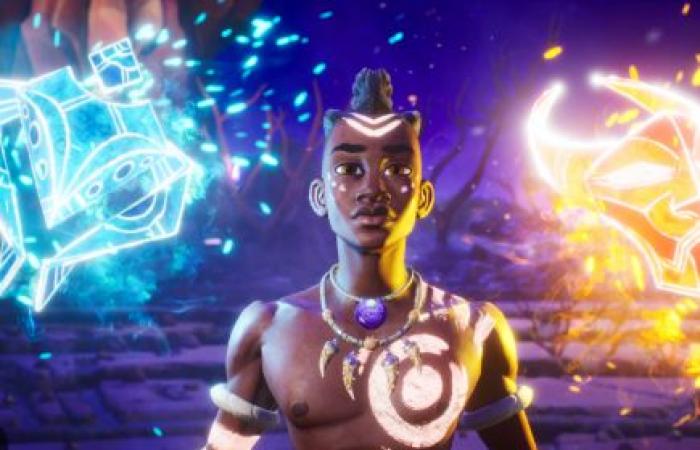An Afrofuturistic video game inspired by Bantu culture, a series of black and London superheroes, and even Star Wars which gives the main roles to two black characters from a culture inspired by Africa… The examples have been multiplying in recent months: characters of Afro-descendant or from African cultures are taking center stage in science fiction stories.
Of course, nothing new – Black Panther has already been there – but the phenomenon is growing. This Friday, Netflix put online Supacellan English series set in modern-day London. Six people who don’t know each other discover they have superhero powers. What do they have in common? They’re all black. And without giving away the plot, we can say that their African origins play an important role in the story.
“An Afro-British perspective”
“I wanted to bring together six black characters to give six black artists the opportunity to showcase their creativity,” explained the showrunner of the series Andrew Onwubolu, better known by his stage name Rapman. With Supacell, Rapman claims to be “the first black person to create, write and direct his own Netflix series.” For this musician and producer, already a director of ambitious music videos and films, and a member of the Order of the British Empire at only 35 years old, Supacell is an opportunity to give “an Afro-British perspective” on contemporary social problems such as suicide, domestic violence or access to healthcare for the working classes.
In Supacellsuperheroes are ordinary citizens who suddenly find themselves given superpowers that are “also very ordinary, like the ones you see in comics,” Rapman tells Deadline. “But I wondered what these people would actually do with those powers. Save the world or improve the lot of their family? And would black people have a unique understanding of their role, given their social position.”
The Unexplored Continent of the Force
If Rapman uses a science fiction trope to talk about Afro-descendants, the series The Acolyte and video games Tales of Kenzera : Zau looks to Afrofuturism, an artistic movement that “places elements of science fiction in an Afrocentric context,” according to critic Mark Dery.
The Star Wars series follows two young black twins who are born and raised in a matriarchal community of “witches,” inspired, according to showrunner Leslye Headland, by “different African communities of women, who are seen as magicians.” Jodie Turner-Smith, who plays the leader of this community, was “excited to play a woman who doesn’t see the Force as a power but as a gift to be cherished, and which she calls the Thread.” The Acolyte indeed introduces black characters who reject the usual opposition between good Jedi and evil Sith of the saga and offer a new voice.
Afrofuturism in video games
But the most recent and exciting example of Afrofuturist science fiction is Tales of Kenzera : Zau. This video game is inspired by the mythology of the Bantu people, to create a science fiction universe with an African aesthetic. The characters are black and the magical elements are taken from tales and ceremonies from sub-Saharan Africa. We follow Zau, a young Shaman from Kenzera, in pursuit of the spirit of his late father. “For Zau’s hairstyle, I was inspired by the Himba tribe, I also drew on the colors and patterns of the Ndebela tribe for several characters,” explains Ackeem Durrant, the game’s artistic director.
“For the buildings and other set pieces, the most exciting challenge was to imagine what a world would look like where traditional African architecture and technology evolved with steam and electricity and without Western influence,” says Ackeem Durrant. But the Afrofuturist challenge of Tales of Kenzera does not stop at costumes and sets. “The game talks about mourning, the quest for oneself through trials and discoveries linked to one’s family history, one’s ancestors…”
Grief and personal ambition
The influence of Bantu culture – from which the family of the game’s creator Abubakar Salim comes – on Tales of Kenzera and its gameplay is measured in particular in the notion of “return to life”, which is a key concept of the game. “When you create an ambitious game, the goal is always to arouse new emotions in players, new sources of wonder, new sensations, explains Ackeem Durrant. Research and travel in Africa, in different countries and among different tribes, have nourished our work. We observed different rituals for example and some gave birth to scenes in the game. We had a story to tell and we used elements of Bantu culture to do it.”
The studio’s first game, Surgent Studios, created by Abubakar Salim, Tales of Kenzera is a manifesto. The young man thus pays tribute to his own father, a Kenyan computer engineer who died. Actor (he played in Assassin’s Creed Origins and is on the bill for House of the Dragon), Abubakar Salim is also a video game enthusiast. He uses this passion, which he shared with his father, to connect with his African origins… By his own admission, the world of Kenzera will return in future games or films. SF has not finished traveling in Africa.






